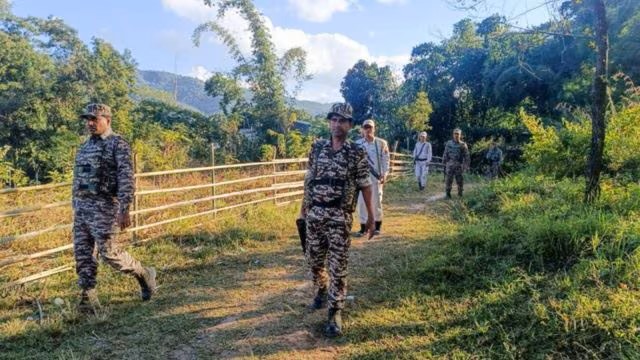A suspected Kuki-Zo militant was apprehended in Jiribam on January 10 with a substantial cache of explosives. The arrest highlights the persistent challenges posed by insurgent groups in the northeastern state, which has been grappling with ethnic tensions and sporadic violence for decades.
Arrest Details and Seized Explosives
According to official sources, the joint operation was conducted by Manipur police and paramilitary forces based on specific intelligence inputs. The arrested individual, whose identity is being withheld for security reasons, was intercepted near a highway in Jiribam, a district bordering Assam. During the operation, the security forces seized a range of explosives, including improvised explosive devices (IEDs), detonators, and other materials typically used in assembling bombs.
Preliminary investigations suggest that the militant was transporting the explosives for planned attacks targeting sensitive installations and rival groups. “This seizure has potentially averted a major incident. The recovery of such materials indicates the continued activity of militant networks in the region,” said a senior police official.
Context of Militant Activity in Manipur
Manipur has a long history of insurgent movements, often rooted in ethnic and political grievances. The Kuki-Zo community, one of the significant ethnic groups in the state, has seen the rise of various armed factions claiming to represent their interests. These groups, often involved in clashes with rival communities and the state forces, have contributed to a volatile security environment.
The arrested militant is suspected to be part of one such faction, which has been under the radar of security agencies for its alleged involvement in extortion, smuggling, and violent attacks. Jiribam’s strategic location near the Assam-Manipur border makes it a transit point for illegal activities, including the movement of arms, drugs, and explosives.
Security Implications
The arrest and seizure of explosives have raised concerns about the possibility of escalated violence in the state. Security forces have intensified surveillance and checkpoints in Jiribam and surrounding areas to prevent the movement of militants and contraband. Additionally, intelligence agencies are probing potential links between the arrested individual and larger militant networks operating in the region.
Officials have emphasized the importance of community cooperation in addressing the insurgency problem. “The role of local communities is crucial in identifying suspicious activities and individuals. Trust between civilians and law enforcement can significantly enhance our efforts to maintain peace,” a senior official noted.
Ethnic Tensions and Their Impact
Manipur’s ethnic landscape has been a significant factor in its insurgency issues. The Kuki-Zo community’s demands for greater autonomy and recognition have often brought them into conflict with other ethnic groups, particularly the Meiteis and Nagas. These tensions have occasionally spilled over into violence, further complicating efforts to maintain stability in the state.
The latest arrest underscores the urgency of addressing the root causes of these conflicts. Analysts have pointed out that while security operations are necessary to counter immediate threats, a long-term solution requires political dialogue and reconciliation among the state’s diverse communities.
Steps Towards Stability
In response to the arrest and the broader security challenges, the Manipur government has reiterated its commitment to maintaining law and order. Chief Minister N. Biren Singh recently emphasized the need for a multi-pronged approach that includes strengthening border security, addressing socio-economic grievances, and engaging with insurgent groups willing to surrender and join peace talks.
The central government’s role is also critical in this regard. By facilitating dialogue between the state government, ethnic leaders, and militant groups, New Delhi can help create a framework for lasting peace in Manipur. Programs aimed at economic development, education, and infrastructure can further address the socio-economic disparities that often fuel insurgencies.
Looking Forward
The arrest of the Kuki-Zo militant in Jiribam serves as a reminder of the persistent security challenges in Manipur. While the recovery of explosives is a significant achievement for law enforcement, it also underscores the need for continuous vigilance and proactive measures to counter militant activities.
As the state navigates its complex ethnic and political landscape, the path to peace will require a blend of robust security operations and inclusive dialogue. The involvement of all stakeholders—from local communities to national policymakers—is essential in ensuring that incidents like this become a thing of the past, paving the way for a stable and prosperous Manipur.


